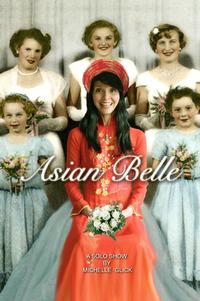 If you are one of those people who believe that if a writer bases a story on his or her life experience, it indicates their lack of imagination, don’t be so picky. Sometimes our reality creates better plots than our daydreaming. An example is “Asian Belle,†a play about a Vietnamese American woman from Alabama, composed and delivered by Michelle Glick.
If you are one of those people who believe that if a writer bases a story on his or her life experience, it indicates their lack of imagination, don’t be so picky. Sometimes our reality creates better plots than our daydreaming. An example is “Asian Belle,†a play about a Vietnamese American woman from Alabama, composed and delivered by Michelle Glick.
Her first solo show, Glick’s performance is one of the brightest and funniest at the Eleventh Annual Midtown International Theatre Festival in New York City this summer. The story is autobiographical, and it is told with inner energy and passion by the playwright herself. From the protagonist’s narrative, the audience finds out about the woman’s childhood and early years when she discovers that it is quite hard to fit in if you are neither white nor black in the rural South, where everyone is pretty much the same. Her story is not only informative, but also extremely entertaining, as she reveals contradictions that exist inside her, mocks her mother’s Vietnamese accent and moves around like a cat, passing her enthusiasm to the audience members.
A big part of the play addresses stereotypes and prejudice against Asians. If you look “Chinese,†according to a common opinion, then it is likely that you don’t speak English and can be ignored. Glick’s experience reminds us of Amy Tan’s “Mother Tongue,†an essay about language, cultural peculiarities reflected in it and mistreatment provoked by “broken English†the writer’s mother speaks. Like “Asian Belle,†Tan’s essay is personal and brutally honest.
Another theme the comedy explores is personality formation. How does one define who he or she is? Is Glick’s Asian Belle exotic or indigenous? Should she try to fit in or get used to being different and feel “Asian pride� The protagonist makes an attempt to find a place for herself where the two worlds she roots in can peacefully co-exist.
Telling her story, Glick imitates people she comes across, their intonation and manner. There is a teacher who gives Glick a role of an oriental chauffeur, which the protagonists detests; a woman that renames Glick’s brother Carl instead of Kha, which would be hard to remember; and finally, her Vietnamese mother, whom people don’t take seriously because of her accent.
While the content is thoughtful and complicated, the costumes are simple. The only change in dress and setting happens when Glick switches from the protagonist’s role to her mother, who is now divorced and owns a nail salon in Alabama. She puts an apron on and pretends to do a customer’s nails, the process that is reproduced scrupulously, stage by stage. Using her client as a pair of ears, this Vietnamese woman tells her the story of her marriage, expectations and disappointments, as well as how she evolved as a person living in a foreign country and having raised her children in the United States.
Through her Vietnamese mother, Glick explores immigration. When people come from a poor communist country to a high-income “paradise,†what are they supposed to do: assimilate or remain faithful to their religion and culture? Along comes another question: how easy is it to be radically different from your own children? Savoring ridiculous encounters of an Asian-looking American with “normal-looking†ones, the audience realizes that even though it is nice and funny, the play is also sad in some sense, as we are reminded that there is still prejudice and inequality in the society.
As people will never get rid of their xenophobia, “Asian Belle†is a good way to look at “the other side of the coin.†The play shows us that there are no “different†people; there are dissimilar cultures and mentality. It also makes us aware that learning about those differences is very useful in such a diverse multinational country as the United States of America.

Leave a Reply